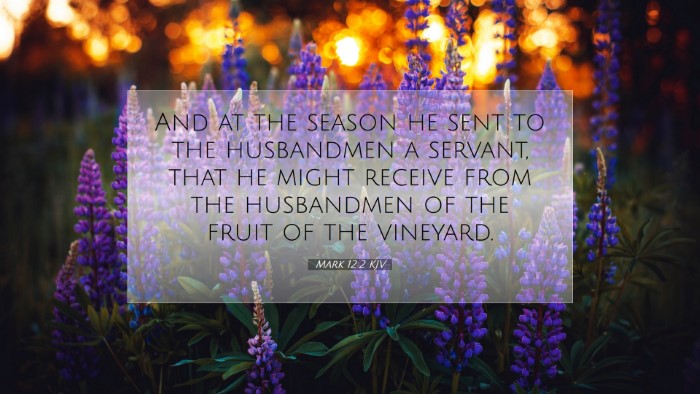Commentary on Mark 12:2
Verse (Mark 12:2): "And at the season he sent to the husbandmen a servant, that he might receive from the husbandmen the fruits of the vineyard."
Introduction
The parable of the wicked husbandmen contains rich theological insights and practical applications. This verse serves as a crucial pivot in the narrative, reflecting God's persistent outreach to His people. It encapsulates themes of authority, stewardship, and accountability. The various insights from renowned public domain commentators offer depth to our understanding.
Contextual Background
This parable, found in Mark 12, unfolds shortly after Jesus's triumphal entry into Jerusalem and his cleansing of the temple, where he challenges the authorities. The vineyard is emblematic of Israel, and the beloved son, who will be referenced later in the parable, symbolizes Jesus himself. In this light, Mark 12:2 serves as a clear communication of God’s expectations from His people.
Commentary Insights
1. Matthew Henry's Exposition
Matthew Henry emphasizes that the vineyard represents the church and its caretakers. The servant sent to the husbandmen symbolizes the prophets sent by God to call His people to accountability. Henry underscored that God's sending of the servant reflects His grace and the heartfelt desire for righteousness. Despite the rejection of God's messengers in history, God continues to pursue His people.
2. Albert Barnes' Notes
Albert Barnes notes that the phrase "at the season" indicates God's timing in sending messengers. This timing speaks to God’s patience and the season of His grace, where He calls for the fruits indicative of true belief and loyalty. Barnes also points out that the servant's role reflects the lesser status of the prophets compared to the authority of the son, underscoring the escalation of rejection that culminates in the rejection of Christ.
3. Adam Clarke's Commentary
Adam Clarke elaborates on the nature of the ‘husbandmen’ representing the Jewish leaders entrusted with spiritual oversight. He remarks that the sending of the servant signifies God’s ongoing relationship with His chosen people despite their unfaithfulness. Clarke interprets this sending as a gesture of love and hope, indicating that the vineyard Owner seeks to collect what is due but is met with obstinacy and pride.
Theological Themes
- God's Patience: The repeated sending of servants shows God's enduring patience and desire for reconciliation with humanity.
- Human Responsibility: The husbandmen's refusal to give the fruits illustrates the accountability of leaders and the consequences of unfaithfulness.
- Prophetic Voice: The servant's role connects to the larger narrative of biblical prophecy, indicating God's continued communication with His people.
- Expectations of Stewardship: The vineyard metaphor extends to Christians today, calling them to consider what fruits their lives are producing.
Practical Applications
For pastors, students, and theologians, the implications of Mark 12:2 are immense. It serves as a reminder of the responsibilities borne by leaders and the expectations for faithfulness in stewardship. The parable challenges believers to assess their own responses to God's call and their commitment to cultivating justice and righteousness in their communities.
Conclusion
Mark 12:2, standing alone, is more than a verse; it encapsulates the heart of the Gospel message of accountability and grace. Drawing from the wisdom of famed commentators, we see how this passage beckons us towards deeper understanding and faithful living. As followers of Christ, we are called not only to receive but to yield the fruits of a faithful life.


